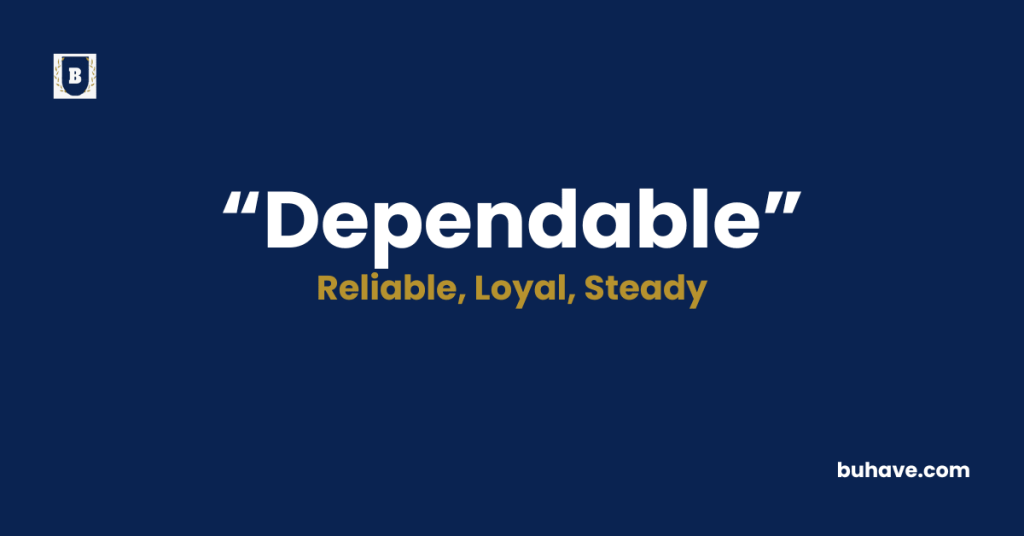The word ‘Dependable’ (Adjective) describes someone or something that people can consistently trust or rely on. To begin with, a dependable person keeps their word and follows through with actions. in this guide, you’ll learn the full definition, synonyms, antonyms, etymology, and real-life examples of how to use ‘Dependable’ correctly in sentences.
Dependable Explained in Depth
A complete and detailed guide to the words Dependable including meaning, definition, examples, etymology, synonyms, and antonyms.
Meanings of Dependable
Dependable means someone or something that others can confidently trust, especially when consistency and responsibility are required. To explain further, a dependable person keeps promises, meets expectations, and shows up when needed.
Moreover, they act with care and follow through without needing reminders. For example, in both personal and professional situations, people often count on dependable individuals to manage tasks or provide support. Consequently, this quality builds trust and stability in relationships.
Overall, being dependable shows strong character and encourages others to rely on you with confidence.
Definition:
The word “dependable” refers to someone or something that people can consistently trust or rely on. To begin with, a dependable person keeps their word and follows through with actions, even when things get tough.
Moreover, they often act with responsibility and care, making them a reliable choice in both personal and professional settings. In addition, they offer support without needing to be asked repeatedly, which strengthens trust over time.
As a result, others feel more confident when working with or relying on someone in Ultimately, this quality plays a key role in forming stable relationships and successful teamwork.
Etymology:
The etymology of the word “dependable” reveals how its meaning developed over time in a natural, human way. To begin with, the root of “dependable” comes from the Latin verb dependere, which means “to hang from” or “to be contingent on.” Over time, this evolved through Old French as dependre and then entered English as “depend” in the late Middle Ages.
Later on, during the 18th century, people began to use the adjective “dependable” to describe someone or something that could be counted on—something that others could metaphorically “hang” their hopes or expectations on. Moreover, by adding the suffix “-able,” it turned the verb “depend” into an adjective that emphasized capability and reliability.
Example Sentences:
- To begin with, Sarah is known as a dependable colleague who always meets her deadlines and helps others when needed.
- Moreover, the car is incredibly dependable, rarely needing repairs and always starting without issue.
- As a result, people always turn to Jack because he is dependable and can be trusted to follow through on his commitments.
- In addition, their dependable service has earned them a loyal customer base over the years.
- Finally, a dependable friend will always be there, whether you’re celebrating good news or facing tough times.
Dependable Synonyms:
- Reliable
- Trustworthy
- Consistent
- Loyal
- Steady
- Loyal
- Faithful
- Predictable
- Solid
- Accountable
Dependable Antonyms:
- Unreliable
- Undependable
- Inconsistent
- Disloyal
- Untrustworthy
- Negligent
- Irresponsible
- Capricious
- Unfaithful
FAQs about Dependable
Here are some Frequently Asked Questions (FAQs) about the word “dependable”
1. What does “dependable” mean?
Dependable means someone or something can be trusted to do what they say they will. If someone is dependable, you can count on them to be reliable, honest, and consistent.
2. Is “dependable” a compliment?
Yes! Calling someone dependable is a strong compliment. It means they’re trustworthy and people can rely on them, whether at work, at home, or in friendships.
3. What’s the difference between “dependable” and “responsible”?
Responsible means someone takes care of their duties. Dependable means others can count on them to actually do it. A responsible person does the right thing; a dependable person always shows up and follows through.
4. Can you give an example of a dependable person?
Sure! A dependable friend always shows up when you need them. A dependable employee comes to work on time and does their job well.
Example: “You can trust Sarah with the project—she’s very dependable.”
5. Can objects or things be dependable?
Yes! Dependable can describe tools, machines, or systems that work consistently.
Example: “This car is old, but it’s still dependable.”
6. How do you use “dependable” in a sentence?
- “He’s one of the most dependable people I know.”
- “We need a dependable babysitter who’s always on time.”
- “This is a dependable brand for laptops.”
7. Can children be dependable?
Yes! Kids can show they’re dependable by doing their chores, finishing homework on time, or helping others without being reminded.

















